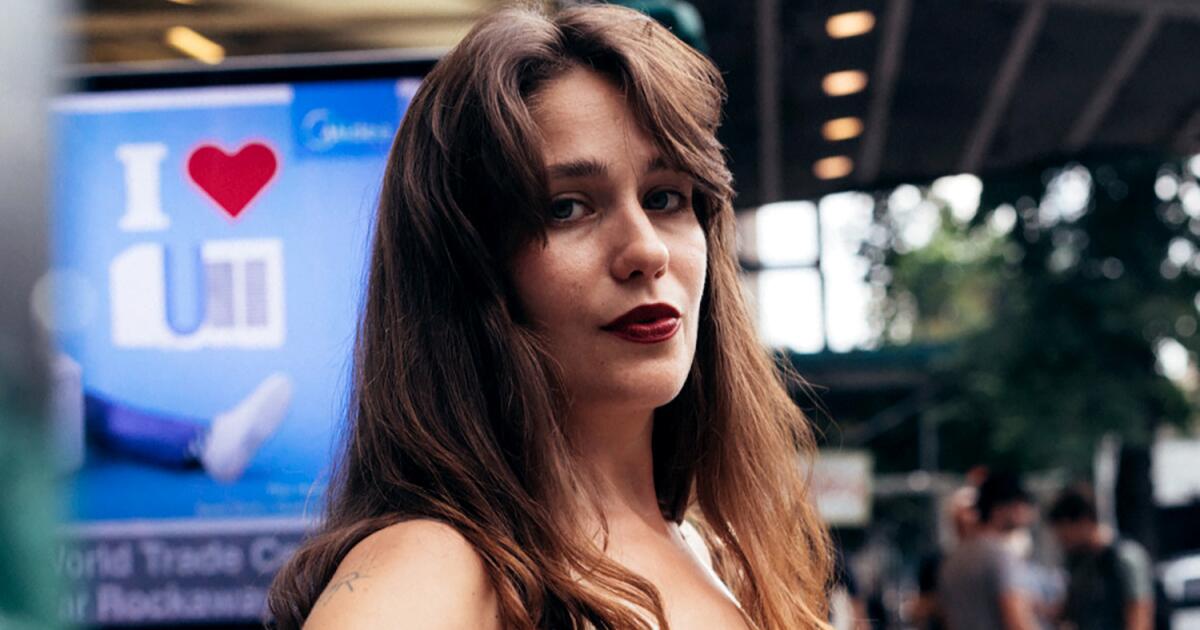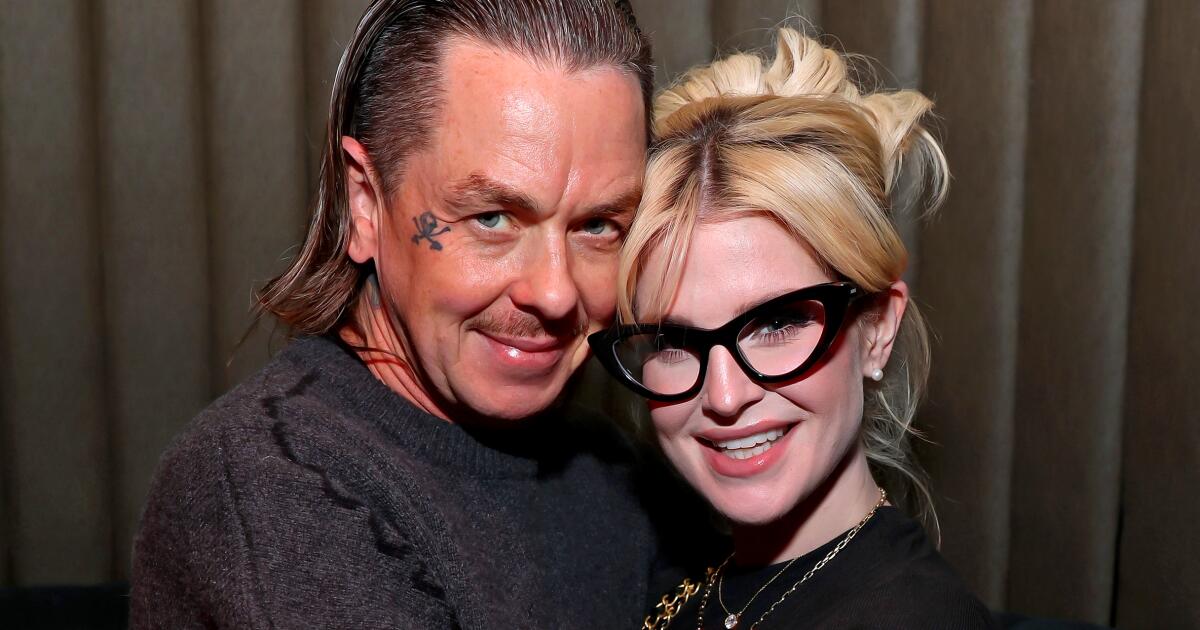Lola Kirke on being fame-ish and finding her own path as an artist

On the Shelf
‘Wild West Village’
By Lola Kirke
Simon & Schuster: 272 pages, $29
If you buy books linked on our site, The Times may earn a commission from Bookshop.org, whose fees support independent bookstores.
When Lola Kirke was a young teen, her “manny” was a fallen rock musician with boundary issues while a movie star friend of the family she calls Gideon (not his real name) seemed a little too friendly when she got high, as the actor-musician recalls in her collection of essays, “Wild West Village.” Then there was the time spent visiting a sister in rehab and the day she learned she had a half brother from one of her father’s affairs.
So, while Kirke grew up with wealth and privilege (she’s the daughter of Bad Company drummer Simon Kirke), and glamorous older siblings (Domino signed to a recording deal in her teens while Jemima became a co-star on “Girls”), life in her expensive New York brownstone and private school wasn’t always easy. She writes about a chaotic family life in a home filled with booze and drugs (Jemima has spoken openly about time in rehab).
Even as Kirke found success on her own, for her prominent role on “Mozart in the Jungle” among other projects, she was struggling with her sense of who she was, drinking and smoking and sabotaging herself along the way. Now 34, living in Nashville and with a burgeoning country music career and a stable relationship, Kirke has turned to self-reflection, and although the book is subtitled “Not a Memoir (Unless I Win an Oscar, Die Tragically, or Score a Country #1),” it is very much is a memoir.
Kirke spoke recently with The Times about her unusual upbringing and writing about it. This interview has been edited for length and clarity.

Do you think of yourself now as a country singer or as somebody who sings and acts and now writes?
I think of myself as a person who sings and acts and now writes. I don’t think it’s wise, at least for me, to identify as anything other than a person. Life’s too precarious, and if you’re lucky enough to try to make art as your career, it’s so volatile that I feel like you have to ground yourself in your personhood first.
Why did you call this not a memoir?
I describe myself as fame-ish, not famous. Writing a memoir at my age, I’m straddling a bizarre line — it’s not just a literary memoir, but I’m not fully in the celebrity lane, even though so much of the world in which I grew up was about being somebody. The subtitle is me saying that I know I haven’t done the things that you need to do to write a celebrity memoir and poking fun at that idea.
You write about your boyfriend, whom you call The Cowboy, saying that you need to be enough of a “someone” just to yourself. Have you reached that level of acceptance?
It’s taken a lot of work, but I actually feel very grounded in that way now. I’m so grateful because it’s just so exhausting to constantly be trying to be somebody to other people. And that’s so much of what my book is about.
I know that my parents love me to the best of their ability and very, very deeply, and that I got so much out of those relationships, but I didn’t always feel that love. And so my work — whether it’s acting or music or writing — is me saying, “I love you,” and wanting someone to say, “I love you, too.” Now I’m able to see, I am loved, too, and I don’t need to chase something that is very much already there. And that’s a relief.
Did you need to find yourself to write the book, or did writing it help you get past your insecurities about your identity?
Writing has helped me discover and articulate who I am in a way that I never knew. So much of great writing when I read it is naming the unnameable. When somebody can put into words things you have felt — whether that’s music or prose or poetry or just an advertising slogan — it’s incredible. When I began to write about my life, I really did understand it so much better.
I made the mistake of going on Goodreads and the first review, from a woman named Jennifer from Boston, said essentially, “She sucks and she’s not famous enough to write a memoir.”
Then I’d get three good reviews, so I’d keep going back, but the next one would be “I hate her writing, and who the @#$@ does she think she is?” So I’m getting used to not being liked, and I am grateful to this book and my writing for helping me do that.
Are you naturally funny or were you consciously thinking I need to keep this entertaining so it doesn’t feel more weighty than my life really was?
I aspired to be funny my whole life, but it’s only recently that people have started to tell me I am funny. Reading my writing, I was able to see how much I use humor both positively and avoidantly, so I learned a lot from editing my own work.
But also when I read my own work during editing I’ve noticed this distinct voice I have as a writer. People have said, “Reading your book is just talking to you,” but do you remember Dame Edna? I feel like Dame Edna wrote my book — some delusional grande dame who’s so funny. I don’t know who that person is, but I guess that’s who I am. I think by virtue of the way I grew up, my perspective is going to seem funny in a myriad of ways to other people, whether that’s funny or just, “Oh, she’s a little off.”
I have this kind of delusional charm, but that can be a manipulative tactic to survive. I always wanted people to like me and I didn’t feel safe in the world for a lot of my life so I had to be very charming to feel secure. And now I’m letting go of that a little bit, and thank God, because it’s exhausting. [Switching to a dry, joking tone] It’s exhausting being this charming.
You didn’t find out you had a half brother until your late teens; he was born with severe brain damage and died at 19; you spent a few years visiting him even though your father never did. How did that impact you?
I do think it softened me and opened me up. As a person who is probably more on the precipice of being a mother myself, it’s made me think about what it’s like to be a true mother. I think about unconditional love and learning what that is and learning how to give it. I grew up in this world where you being someone is what earns you a place in the world. At least, that was the feeling I had. With him I saw you are worth love no matter who you are. So that will always be with me.
How concerned were you about showing the book to family members?
The rule I tried to implement, and I mostly do, was that I’d only tell stories about other people that they’ve already revealed themselves in one form or another. But when I shared it with my family, I definitely got feedback of, “Oh, I’ve never told anybody that.”
My sisters have been absolutely incredible about the book, which was so heartening to me. I was most scared of their reaction. Their support feels like the sisterly relationship I write about not having so much throughout the book. So that was a real blessing.
My brother asked, “Why aren’t I in the book more?” But he’s been very sweet about it — he’s 12 years older than me and was pretty much out of the house. But also he just was really good so there isn’t enough drama with him.
There have certainly been other people that have been really upset. But some that I thought might be upset have loved it. It’s complicated to write about people who are alive and to be written about. [With mock petulance] I have yet to be made into a character in somebody’s book…. I’m waiting.




